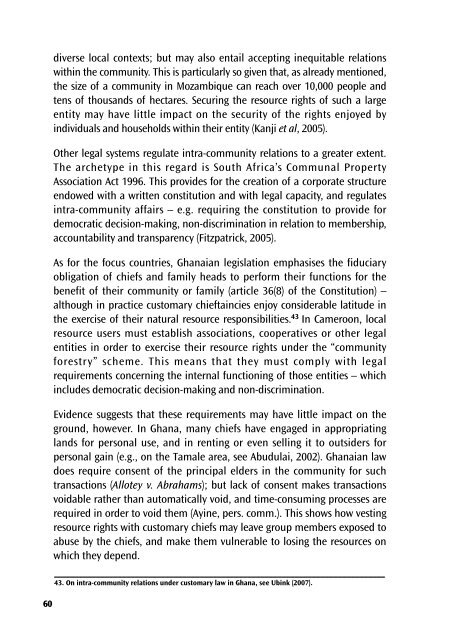Legal empowerment for local resource control
Legal empowerment for local resource control
Legal empowerment for local resource control
Create successful ePaper yourself
Turn your PDF publications into a flip-book with our unique Google optimized e-Paper software.
60<br />
diverse <strong>local</strong> contexts; but may also entail accepting inequitable relations<br />
within the community. This is particularly so given that, as already mentioned,<br />
the size of a community in Mozambique can reach over 10,000 people and<br />
tens of thousands of hectares. Securing the <strong>resource</strong> rights of such a large<br />
entity may have little impact on the security of the rights enjoyed by<br />
individuals and households within their entity (Kanji et al, 2005).<br />
Other legal systems regulate intra-community relations to a greater extent.<br />
The archetype in this regard is South Africa’s Communal Property<br />
Association Act 1996. This provides <strong>for</strong> the creation of a corporate structure<br />
endowed with a written constitution and with legal capacity, and regulates<br />
intra-community affairs – e.g. requiring the constitution to provide <strong>for</strong><br />
democratic decision-making, non-discrimination in relation to membership,<br />
accountability and transparency (Fitzpatrick, 2005).<br />
As <strong>for</strong> the focus countries, Ghanaian legislation emphasises the fiduciary<br />
obligation of chiefs and family heads to per<strong>for</strong>m their functions <strong>for</strong> the<br />
benefit of their community or family (article 36(8) of the Constitution) –<br />
although in practice customary chieftaincies enjoy considerable latitude in<br />
the exercise of their natural <strong>resource</strong> responsibilities. 43 In Cameroon, <strong>local</strong><br />
<strong>resource</strong> users must establish associations, cooperatives or other legal<br />
entities in order to exercise their <strong>resource</strong> rights under the “community<br />
<strong>for</strong>estry” scheme. This means that they must comply with legal<br />
requirements concerning the internal functioning of those entities – which<br />
includes democratic decision-making and non-discrimination.<br />
Evidence suggests that these requirements may have little impact on the<br />
ground, however. In Ghana, many chiefs have engaged in appropriating<br />
lands <strong>for</strong> personal use, and in renting or even selling it to outsiders <strong>for</strong><br />
personal gain (e.g., on the Tamale area, see Abudulai, 2002). Ghanaian law<br />
does require consent of the principal elders in the community <strong>for</strong> such<br />
transactions (Allotey v. Abrahams); but lack of consent makes transactions<br />
voidable rather than automatically void, and time-consuming processes are<br />
required in order to void them (Ayine, pers. comm.). This shows how vesting<br />
<strong>resource</strong> rights with customary chiefs may leave group members exposed to<br />
abuse by the chiefs, and make them vulnerable to losing the <strong>resource</strong>s on<br />
which they depend.<br />
43. On intra-community relations under customary law in Ghana, see Ubink (2007).

















